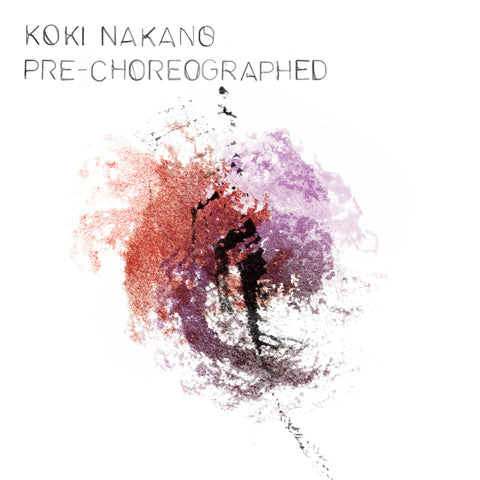Executive production and A&R - Laurent Bizot
Artwork - Jérôme Witz
Graphic design - Element(s)
Koki Nakano - Piano, sounds and effects
Recorded by François Baurin
at Studio Hippocampus, assisted by Rémi Peral on May 25th and 26th 2019
at Studios Ferber, assisted by Matthieu Lefèvre on August 30th 2019
Mixed by François Baurin at studio Hinterland Lab on October 2019
Mastered by Alexis Bardinet at Globe Audio Mastering on November 21st 2019
All compositions by Koki Nakano
Published by Nø Førmat!
------
Thank you a million times for your continued support Laurent Bizot, Masanori Yamamoto, Yoko Yamada
Thank you for your cooperation Carmella Abramowitz Moreau, Bruno Moreau, Jean-François Lefèvre, Rob Coudert
Thank you to dancer Mariko Kakizaki for giving inspiration for this album
It was back in 2016 that Koki Nakano first came to the attention of those who hunger for the wondrous and unprecedented. The nine pieces on his first album Lift, recorded for Nø Førmat! with help from cellist and admirer Vincent Segal, revealed a composer of singular talents. His work evoked the light and shade of French impressionism, the rigor of American minimalism, the poetry of jazz’s dreamier fringes and the go-large melodies of pop. It displayed a subtle versatility, a high-wire delight in floating above established musical genres.
Pre-Choreographed is the sequel to that beautiful opening chapter, a new episode in Nø Førmat’s adventures with the emancipated genii of the piano, which began fifteen years ago with the release of Chilly Gonzales’s classic Solo Piano.
Koki Nakano has spent time in the worlds of both classical music and electro-rock (with his band Gas Law). After training at the prestigious Toho Gakuen music school and the Tokyo University of the Arts, he embarked on his career with the strength and serenity of a man who had already ditched all those qualms about identity and heritage that often hobble young musicians. The rich genealogy of his music seemed to have been decanted and cleared of hereditary sediment, leaving only subtle traces in an otherwise limpid and luminous style. After seeing this Japanese prodigy perform at the Maison de la Culture in Tokyo in June 2014, Laurent Bizot decided to sign Koki Nakano to his label Nø Førmat!
The title of Koki’s previous album Lift evokes a move well-known to ballet dancers: the porté. Literally meaning ‘carried’, the porté is an exacting figure requiring strength and delicacy, suppleness and firmness, risk-taking and mastery of balance – all of which reads like a resume of the art of the piano according to Koki Nakano. The title also conveys the deep relationship, both physical and spiritual, that Koki’s music maintains with dance, a bond he’s been cultivating ever since he moved to Paris in 2015. A pivotal moment was seeing Sara, a piece performed by the L-E-V dance company in front of the Nymphéas by Monet at the Musée de l’Orangerie in Paris. For Koki, the performance conjured up the petals of the belle-du-jour, a climbing plant whose blooms open every morning and close up again the same evening, according to a secret mechanism in which the one and the many are united by their unbreakable cooperation and synergy.
“When I compose, I always keep images of bodies in a state of movement up in my head,” Koki explains. ‘They’re a great help to me when it comes to structuring each of my pieces, which progress as if they were responding to those movements.”
Among the other catalysing elements that inspired Pre-Choreographed, Koki cites his collaboration with the artist and sculptor Kohei Nawa, and his conversation with the choreographer Damien Jalet, who confided to him that “the big question now is to know how one comprehends the world: is the environment an extension of our bodies? Or are our bodies the extension of our environment?”
The title of Pre-Choreographed speaks of Koki’s desire to see a reunion – all too often thwarted, far too long differed – of music and dance. “The title reflects the keen sense of saudade that I’ve been feeling, for a time in which these two disciplines were closely bound together, when they functioned jointly in society. It also implies that, on this record, music is in a state of ‘waiting’ for, or even ‘lacking’, choreography. Hence its intensely raw character and lack of any superimposed direction.”
With its starkness, its refusal to indulge (none of the pieces exceed four minutes in length), its defiance of flashy virtuosity, Pre-Choreographed has the elegance of a work of art that knows how to say a great deal with very little. And though the music dreams of being coupled with choreography, it’s never rough or unfinished. Quite the opposite is true, as if the vibrant suspense created by the desire for dance gives the writing of Koki Nakano a full and vital momentum.
This alchemy is in play from the prelude ‘Overlay’, in which the natural timbre of the piano ends up being transformed almost imperceptibly into a foam of electronic effects. The pieces that follow oscillate between clear melodic lines (‘Minim’, with its haunting motif of jabbed notes), fine cross-hatching (the intermingled loops of ‘Graftage’) and compositions that border on graceful abstraction, or the latticework textures of ‘Choreographed Mollusk’, a “nocturne for the creatures from the great deep or from other planets” inspired by the Faun, a dance choreographed by Sidi Larbi Cherkaoui. There’s the slowly unfolding melody of ‘Near-Perfect Synchronisation’, which traces the soundtrack “of a couple crossing the North Pole with calm determination, whilst icebergs split all around them and broken satellites fly backwards in the sky…”
Elsewhere, arabesques open up like corollas to deliver intoxicating harmonics, as in ‘Bloomer’, a piece sprinkled with a delicate film of scratches and scrapes. There are iridescences on ‘Genou Respirant’ that remind you of Ravel’s Une Barque sur l’Océan, there are dreamy loops (on ‘Berceuse’) and intricate, turbulent percussive explosions (on ‘Palinopsia’ and ‘Train-train’), coming to a moonlit climax with the resonant chords of ‘Faire le Poirier’, in which the whole album seems to crystallize.
Claude Debussy, Steve Reich, Frédéric Chopin, Aphex Twin – it’s easy to hoist the names of a few great souls who, like distant will-o-the-wisps, illuminate the background to Pre-Choreographed with their flashes. Koki never forgets that his art is the legacy of a rich musical history, rendered even more fertile in these globalised times, but he’s also careful not to confuse the art of the piano with a séance or a game of reference-roulette. His music, first and foremost, aims to gather together genuine microcosms of the soul and transcribe life as it’s actually lived into notes and sounds.
“The sources of inspiration and the titles of my pieces are all linked to the ‘mental landscapes’ that I’ve travelled through over these past three years,” he explains. “[These] could be the fruit of an experience, of something seen, of a real landscape… Its exact nature will come down as much to the moment in which it was born, as to the state of mind in which one found oneself at that moment. Which explains, once again, the variety on this album.”
Koki Nakano’s basic intention resides in the urge to re-transcribe the intimate topography of a man’s life, whilst remaining deliberately detached from fashions, slogans, from a binary vision of the history of music in which modernity and past, avant-garde and classicism, new and old stand in opposition to each other as a matter of principle. For that reason, his creations never emit the dusty odour of schools and lecture halls, or the perfumed incense of chapels.
“As far as I’m concerned, people who talk about music in terms of genre are prodigiously boring,” Nakano says. “I’ve never looked at it in that way. You could always describe me as a Japanese artist who learned how to play a European instrument and who takes western music as his foundation. But right now, my only motivation is to grab the piano like I would an ideal tool and express my emotions, finding new ones through my research. On this album, I’d like to capture the humour of an epoch in which each and every person, whatever their age or their origins, is able to contribute to the evolution of art. That, I think, is what artists need: to confront their own authenticity and immerse their whole being in it, profoundly.”
In this way, with his stirring and protean savoir-faire, Koki Nakano pollinates the most precious element on this album, the one which, for many musicians, is often also the hardest to access: namely, innocence.



